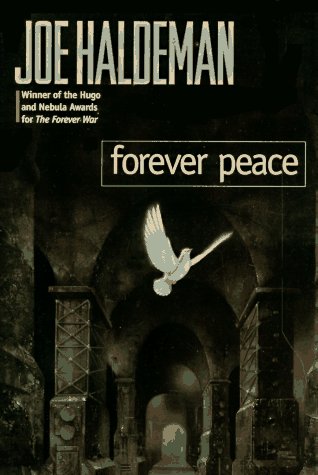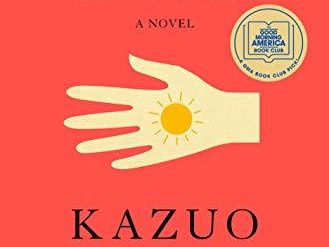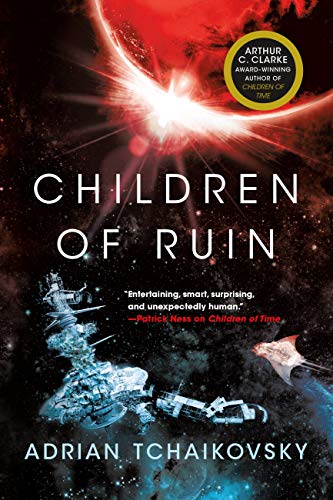
Estimated reading time: 5 minutes
Stories of First Contact abound in science fiction. One author, Australian Peter Cawdron, alone is writing a total of twenty-five standalone novels on the theme—and he’s close to his goal as I write. But the British phenomenon Adrian Tchaikovsky has done them all better. In Children of Ruin, the sequel to his Nebula-Award-winning novel, Children of Time, he treats us to an intimate picture of First Contact—among four species at once. Human beings are one of the four, but the least of them. Two of the others were uplifted to sentience by human agency. But the fourth seems entirely alien. And it all plays out in a sprawling tale that brings the races together over 10,000 years as this award-winning series continues.
A convincing portrayal of alien thinking
Children of Ruin is not an easy read. It’s densely written, with far more space devoted to narrative text than dialogue. And the story jumps around from one of three planets to another, sometimes leaping back and forth over thousands of years at a time. Tchaikovsky does a brilliant job bringing us into the alien minds of spiders, octopuses, a single-celled organism, and a hybrid human/AI as well as human beings—few of whom think in simple, straightforward ways. For a casual reader, the novel will present a challenge. Its rewards lie in the author’s supremely successful portrayal of alienness.
Children of Ruin (Children of Time #2) by Adrian Tchaikovsky (2019) 608 pages ★★★★☆
Winner of the 2023 Hugo Award for Best Series
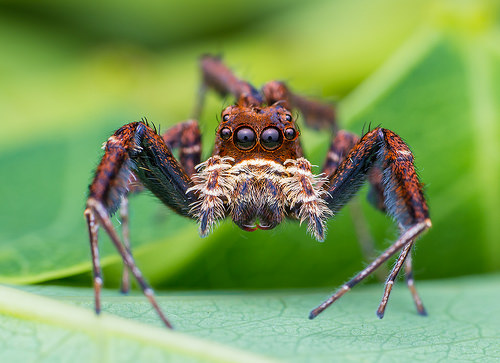
A story that leaps across thousands of years
The storyline is far too complex to sketch out here. Suffice it to say that the events portrayed in the novel take place in three different periods that stretch over ten millennia.
- First, but last chronologically, we join the crew of a starship from Kern’s World. There, the renegade Earth scientist Avrana Kern had accidentally uplifted Portiid spiders (instead of the monkeys she’d hoped to favor). Human beings have learned to live and communicate with the spiders and are now known as Humans (upper-case H). A complement of sentient spiders, along with a handful of Humans, have journeyed to the planets we come to know as Nod and Damascus.
- Second, we gain a window on the lives of the people of Damascus. They’re octopuses who gained sentience as a result of the impulsive and unauthorized experiments of another rogue human scientist many years earlier. This happened hundreds (or perhaps thousands) of years before the visit of the spiders’ starship.
- Third, we double back to the visit of that ship to Damascus in what passes for the present. And when the spiders approach their planet, the octopuses are not pleased. War is about to break out.
- Meanwhile, there are hints about the mysterious nature of a life-form on the planet Nod. As we will learn later, this nameless life-form has come to integrate most of the other species on Nod much like the Borg of Star Trek fame.
Unless you pay very close attention, this can get very confusing indeed. But it’s worth it in the end. This award-winning series deserves the praise it has received.
About the author
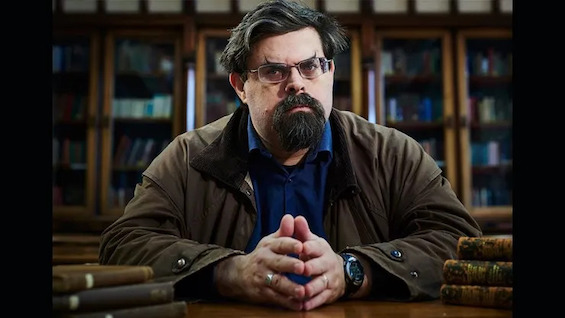
According to his bio on Adrian Tchaikovsky‘s author website, he “is an award-winning and highly acclaimed science fiction and fantasy author with works published at home in the UK and internationally. He primarily explores deep themes, such as artificial intelligence and alien awareness within epic galactic and fantastical settings. [Tchaikovsky] has a deep interest in the animal world, specifically insects, from his studies in zoology and has a particular penchant for spiders.”
Wikipedia notes that Tchaikovsky was born in 1972 in Lincolnshire, England, and studied zoology and psychology at the University of Reading. (He is unrelated to the famous Russian composer of the same name. His origins are Polish.) Before turning to writing full-time, he worked as a legal executive for a group of solicitors in Leeds. He now lives there today with his wife and a son. Both Children of Ruin and its predecessor, Children of Time, won major science fiction awards.
For related reading
You’ll find Adrian Tchaikovsky included at Ten new science fiction authors worth reading now.
I’ve reviewed six of the author’s other novels:
- Children of Time (Children of Time #1) – Accelerated evolution is the theme in a superior science fiction novel
- Children of Memory (Children of Time #3) – This extraordinary series won the Hugo Award
- The Expert System’s Brother – An exceedingly clever science fiction story
- Walking to Aldebaran – A science fiction novel that reads like a fever dream
- Firewalkers – A dismal, dystopian future where the climate has run amok
- Ironclads — In a clever novella, a future of endless war
For more good reading, check out:
- These novels won both Hugo and Nebula Awards
- The ultimate guide to the all-time best science fiction novels
- 10 top science fiction novels
- The top 10 dystopian novels
And you can always find my most popular reviews, and the most recent ones, on the Home Page.

